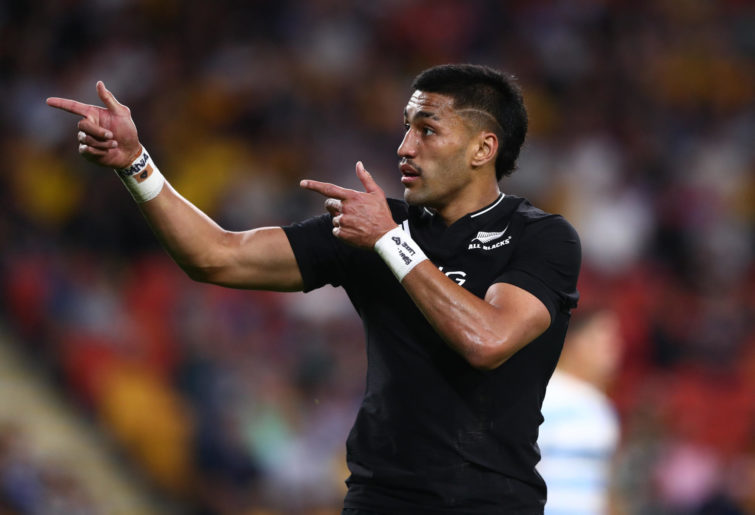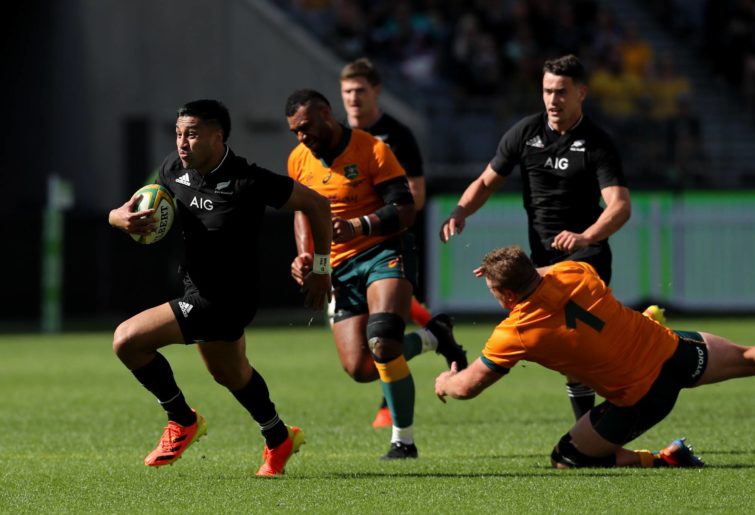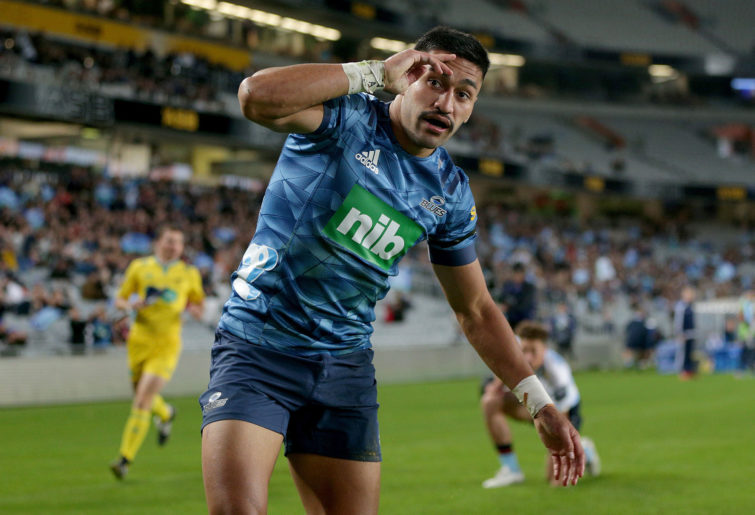When retired New York District Attorney Vincent Bugliosi wrote his book on the OJ Simpson trial, he observed that the final verdict was “in the air”, that no matter what happened on the floor of the court, no matter the evidence presented, a not guilty verdict seemed to be a preordained outcome.
No matter which New Zealand media source or form you prefer, increasingly the selection of Rieko Ioane at centre seems certain. A lock-in is the current vernacular.
Although even the strongest affirmation is often followed by the disclaimer that his defence in the position is improving.
Improving! When did this become an acceptable performance level for a position that for so long has been the core of the national side?
We have been spoiled of course in the past. At his last Rugby World Cup, Conrad Smith went through the tournament with a tackle record of 39 made and zero missed.
Now, it seems we are happy to accept a player who is improving his defence at international level but still managed to miss a full handful of tackles against the struggling Highlanders earlier on in this season.
This is the bit that really confuses me.
New Zealand, as a country, have become overly obsessed with running rugby as our default tactical preference, to such an extent that we are willing to put aside the world’s premier strike weapon on the left wing to let him play in a position where his returns both personally, and for the All Blacks, are sub-par because we think/hope/pray it may assist with our attacking game.

(Photo by Chris Hyde/Getty Images)
But it has not, but we are seemingly prepared to concede his seriously proven world-class try scoring talents as a left wing in return for purest optimism.
Ioane exploded onto the scene as an international winger, scoring for fun. He was all sorts of difficult to stop anywhere the whitewash, blessed with that rare combination of blistering speed and strength. And if he was still a part of a back three, together with Will Jordan and Jordie Barrett, teams are going to think long and hard about how they kick to the All Blacks.
Since his move to the midfield in internationals, here are the position comparison numbers to date:
Winger: 34 games, 26 starts, 27 tries and a 78 per cent win rate
Centre: 13 games, nine starts, four tries and a 66 per cent win rate
Hardly compelling, is it.
If you were a CEO or chair at an AGM answering questions from your shareholders about your allocation of premium resources, you might be in for an interesting hour or two, but no, questions rarely get asked of the coaching team about actual real outcomes.
Let’s examine that position that he adds attacking flair to the All Blacks’ midfield by viewing a few select recent games through the lens that New Zealand have five Tests against Ireland and South Africa coming up this year.
These are the attacking stats for major matches in 2021:
Versus Ireland: six runs, for four metres for one defender beaten
Versus South Africa: one run, for two metres and zero defenders beaten
Hardy a ringing endorsement, is it.
Things looked a whole lot more compelling against Les Bleus:
Versus France: Ten carries for 43 metres and one defender beaten
Until, of course, we remember that he scored that magnificent try when Sam Whitelock turned over Antoine Dupont at the base of the ruck, Aaron Smith sent the boys away and we saw some serious after-burner stuff from Ioane from near the halfway line.
Rest of the match, not so much. I do note that his entrances into the back line look an awful lot like the kind of line from a wing insert play, which remains a huge positive.

(Photo by Will Russell/Getty Images)
An interesting outlier popped up from the French match. When I was going back over my notes on the game, I saw Ioane had not made a tackle in the game. Surely not, right?
So I checked both the available public sources for match stats and got the same result, and for good measure I quickly went through the 30-minute video summary of the game.
Still nothing.
An All Blacks centre, a key spine position, did not make a tackle in a game New Zealand not only lost, but conceded 40 points in, while the new boy playing in the 12 shirt made ten tackles that day.
How does that happen?
I will make the assertion that this has never happened before in New Zealand Test rugby history.
This goes back to our 2021 discussion on the unbalanced ratio of non-platform players to platform players in the All Blacks as being one of the major causes for their current malaise, and you simply cannot have a non-platform player running around in the 13 shirt.
In the weekend game versus the Rebels, there was a string of commentary, which further embedded the All Blacks’ current issue with ignoring gain-line dominance.
I will note that the Brumbies are currently dishing out the same gain-line lessons to the New Zealand Super Pacific sides that South Africa, Ireland and France handed out to the national team in 2021 and so far, lessons do not appear to be hitting home.
As I don’t have access to clip the video, a short description of the relevant action will need to suffice.
In the 45th minute, the Rebels are on attack. The Rebels’ 13 gets the ball 15 metres out going left, Ioane is positioned too narrow, and gets beaten on his outside shoulder. But he makes a from-behind legs tackle, dragging down his opposite one metre from the try line, but with lightning quick ball being a very real risk at next phase.
This is what we heard from the New Zealand commentary team.
1. Ioane is getting comfortable with using his speed to make tackles on those that go outside him.
Allow me a couple of observations.
I am glad Justin Marshall is delighted Ioane is comfortable in this situation because I have a list of those who are not:
– The guy defending on his immediate outside who has to hold a narrower position to compensate
– The 14 other blokes in his team who now have to retreat back to their own goal line to get on-side and stay in the game for the next phase
– The loose forwards who have to scramble like hell to get back and across to a ruck on their goal line which should not be there
– And a fullback who has to put his body on the line to make a tackle in the corner

(Photo by Dave Rowland/Getty Images)
2. This is follow-up commentary from the same protagonist.
This is international standard defending.
No, it’s not, it’s the kind of defending at centre that gets you dragged in a school first XV game. This is defending like a wing at centre without the assistance of the touchline.
It is worth noting that the guy who made those crucial metres on the outside and put the Blues under pressure was a 20-year-old in his debut season with a handful of Super games under his belt.
Imagine the same situation with Bundee Aki, Gary Ringrose, Robbie Henshaw, Damien de Allende or Lukhanyo Am being that ball runner later on this year. It seriously doesn’t bear thinking about.
I am not convinced running roughshod over the likes of the Melbourne Rebels advances the case for Ioane at centre for the All Blacks, and there is certainly nothing in the recent international season to suggest value in the continuation of this experiment.
This is when we should have the single most dangerous left winger in international rugby back in position, scoring tries and winning matches for his country.
There are only 18 more Tests until the Rugby World Cup begins and we cannot afford to waste a single one, especially as the All Blacks have such an excellent record of taking quality back-three players and asking them to play at centre.
Where’s the irony emoji?
Springboks prop Frans Malherbe joined The Roar rugby experts Brett McKay and Harry Jones to talk about his unusual rugby origin story, what surprised him about the United Rugby Championship coming out of Super Rugby, and Rassie Erasmus’ call for a specialist scrum referee.
































































































